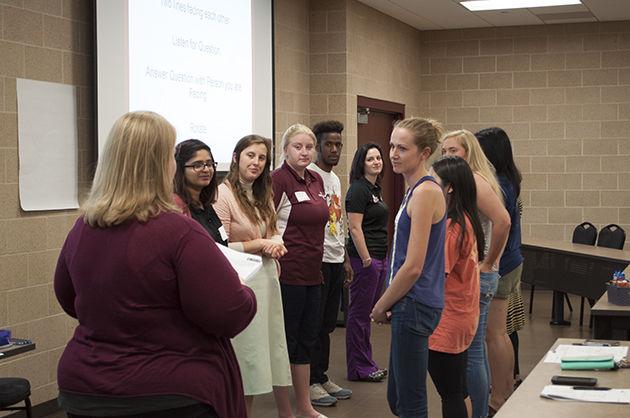With April deemed Sexual Assault Awareness Month, the Stand Up workshop was held Tuesday to educate students on how to be a support system for sexual violence survivors.
The Stand Up workshop, which was held in the Student Recreation Center, was created by Heather Wheeler, Women’s Resource Center program coordinator, Hilary Park, university nurse practitioner, and Kristen Harrell, associate director of Student Life. The goal of the workshop was to inform attendees on what resources are available to survivors, as well as how to help a survivor work through their trauma, whether it was sexual assault, sexual harassment, stalking or domestic violence.
Harrell said while often times survivors will go to their friends for help rather than a law enforcement or university official, it is important to know which avenues to send them to for proper help.
“Sometimes we need to realize that we are not the best person for them to talk to,” Harrell said. “But if they disclose to you, they disclose to you for a reason. Maybe the circumstances were that you were there for them, but we need to learn how we can help. And sometimes that’s passing them off through the proper channels.”
To begin the workshop, Wheeler asked participants to list concerns they had about talking to sexual assault survivors.
“We want to get all these fears in the room, so we can address them as we go through the workshop,” Wheeler said.
Common answers from the participants included being wrong or misinformed, memory loss, dealing with law enforcement and not being able to understand the experience. Wheeler and Harrell listed strategies to helping survivors cope, one of which was letting them know which options they have, including on-campus resources, legal aid, hotlines and counseling.
“Being able to know those resources and give survivors options is vital,” Harrell said. “It is totally okay for your to know about these and refer people to these resources. If you’re in a support role, know that those are also available to you.”
Harrell said the Stand Up workshop is one of few, if any, workshops that focuses specifically on educating friends of survivors.
“To our knowledge, this is the only workshop specifically with this kind of content,” Harrell said. “It’s not uncommon for this type of training to happen, so some institutions may have peer education training. This is the only one we are aware of that’s tailored to this three-hour model and intended for a broader audience.”
The workshop also included a section on the neurobiology of the brain, when Park explained how the brain operates during a high-stress event.
“When you are in a trauma situation, your brain figures out, ‘How can I get out of this alive?’ So we don’t process things the same way,” Park said. “You immediately act — you don’t sit and process through it.”
Park also said people deal with high-stress situations differently and often combine coping methods.
“Some people deal with tragedy in a lot of different ways,” Park said. “Some people use humor, some might have anger. There will be those with depression and anxiety. But a mixture of all of those is very common.”
Harrell detailed the role of a “mandatory reporter,” or someone required by law to ensure an incident of abuse is reported, and what tools they have available to them. Harrell also said if a student is confused about whether or not a situation is reported, to call Student Services for help.
“If you aren’t sure something needs to be reported, call us,” Harrell said. “Give us a hypothetical and we can help you decide if you need to report something.”
The STAND UP workshop is a part of A&M’s “Step In Stand Up” campaign about sexual violence. Additional information can be found on their website.
Stand Up workshop teaches strategies for supporting sexual assault survivors
April 4, 2017
0
Donate to The Battalion
$1815
$5000
Contributed
Our Goal
Your donation will support the student journalists of Texas A&M University - College Station. Your contribution will allow us to purchase equipment and cover our annual website hosting costs, in addition to paying freelance staffers for their work, travel costs for coverage and more!
More to Discover










